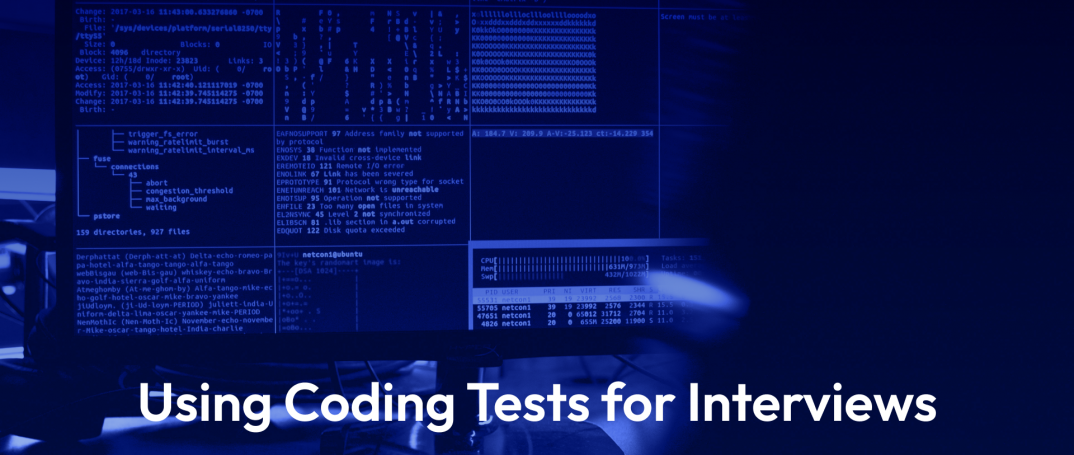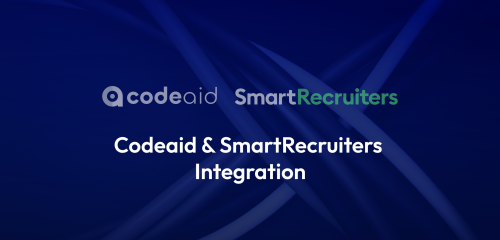It’s easy to say that every company wants to find top talent—someone who checks off all the boxes, has the necessary technical abilities, and contributes to a stronger team—but how?
With a coding test platform, companies can take the guesswork out of the hiring process by providing a reliable, standardized way to assess candidates’ skills, ensuring they are the right fit for the role and the team.
This not only streamlines the hiring process but also leads to more accurate and confident hiring decisions. Ultimately, implementing coding tests helps companies build stronger, more capable teams that are equipped to tackle complex challenges and drive innovation.
So what are the benefits of implementing a coding skills test? What are the different types of coding tests for interviews?
Keep reading to discover the answers to these questions and more.
What are Coding Tests for Interviews?
A coding test is a structured assessment used in technical interviews to evaluate a candidate’s programming skills and ability to solve real-world problems. It provides a clear, objective measure of their technical expertise and suitability for the role. By simulating job-related challenges, these tests provide employers with a standardized way to evaluate whether a candidate has the expertise required to excel in the role.
Benefits of Using Coding Tests for Interviews in the Hiring Process
If your company has never used coding assessments in the hiring process, then you may be missing out on an opportunity to make hiring more efficient, objective, and effective.
Keep reading to explore the key benefits of using coding tests for interviews.
Ensuring Objective Evaluation
Coding assessments offer a structured and standardized method for evaluating technical skills, enabling recruiters to assess candidates based on measurable outcomes. By focusing on demonstrated abilities rather than subjective factors like resumes or personal impressions, these assessments reduce bias and promote fairness. This approach ensures a more equitable hiring process, highlighting candidates’ true potential through objective performance metrics.
Time and Cost Efficiency
Coding tests streamline hiring by quickly identifying unqualified candidates, enabling hiring teams to focus on top talent. By providing a clear measure of technical skills early in the process, these assessments save time and resources that would otherwise be spent on less suitable applicants, therefore helping businesses streamline technical recruitment.
Improving Candidate Comparison Consistency
Programming skills tests establish clear benchmarks for objectively comparing candidates’ skills, ensuring evaluations are based on performance rather than subjective impressions. Standardized assessments enable hiring managers to make consistent and accurate comparisons, simplifying the decision-making process and helping identify the best fit for the team.
Enhancing Candidate Engagement
Coding tests enhance candidate engagement by immersing applicants in real-world challenges that reflect the responsibilities of the role. This approach not only allows candidates to better understand the position but also provides them with an opportunity to showcase their skills in a meaningful context. By creating an interactive and role-specific experience, these assessments leave a positive impression, significantly improving the overall candidate experience. This engagement-driven process not only attracts top talent but also fosters a sense of enthusiasm and connection to the company, ultimately contributing to successful recruitment outcomes.
Types of Coding Tests for Interviews
So, what kind of coding tests can your company implement?
There are various types of coding skills tests that can be used in interviews, each designed to evaluate different skill sets and technical abilities.
From algorithmic coding challenges to role-specific customized coding tests, here are some of the technical tests you may be interested in:
Algorithmic Coding Challenges
Algorithmic challenges are designed to assess a candidate’s foundational coding skills, logical reasoning, and problem-solving abilities. These tests are particularly valuable for software development roles that require strong algorithmic knowledge, as they focus on core competencies essential for efficient coding.
Typical examples of algorithmic challenges include tasks involving data structures, sorting algorithms, searching techniques, and graph theory. For instance, candidates may be asked to write code that finds the shortest path in a network or optimizes the sorting of a dataset.
By solving these problems, candidates demonstrate their ability to create functional, efficient solutions, showcasing their suitability for technically demanding roles.
Real-World Scenario-Based Coding Tasks
Scenario-based coding tests replicate real-world work situations to evaluate how candidates apply their coding skills to practical tasks. These assessments not only test candidates’ abilities but also offer valuable hands-on training as they tackle real-world challenges, such as developing a webpage feature, creating an API endpoint, or debugging an existing codebase.
These tests are particularly useful for roles that demand immediate, hands-on application of technical skills, as they demonstrate how candidates approach specific challenges in a work-like environment. Additionally, scenario-based assessments provide valuable insights into a candidate’s ability to follow coding standards, manage detailed task requirements, and understand the underlying application logic, offering a comprehensive view of their readiness for the role.
Multiple-Choice Coding Questions
Multiple-choice coding questions assess candidates’ theoretical understanding and conceptual knowledge of programming without requiring them to write complete code. These questions are commonly used in initial screenings and cover topics such as language syntax, data structures, debugging logic, and programming best practices.
By focusing on foundational concepts, multiple-choice questions quickly evaluate whether a candidate has the baseline knowledge required to advance to more rigorous coding assessments. They are efficient for identifying individuals with solid theoretical knowledge and serve as a valuable preliminary step before moving to hands-on coding tests.
Code Review and Debugging Tests
Code review and debugging tests evaluate a candidate’s ability to analyze, identify, and resolve issues in pre-written code. These tests typically present a code snippet containing bugs, inefficiencies, or errors, requiring candidates to review and correct the code to ensure proper functionality.
Debugging tasks assess critical skills such as identifying logical errors, optimizing performance, and maintaining code quality. This type of assessment is particularly valuable for roles focused on quality assurance, code optimization, and maintenance, such as software testing or senior development positions, where attention to detail and problem-solving are essential.
Project-Based Assessments
Project-based assessments involve larger, comprehensive coding tasks that simulate real-world projects, often requiring several hours or even days to complete. These assessments provide candidates with an opportunity to demonstrate a broad range of skills, including designing system architecture, implementing features, and testing functionality.
Commonly used for advanced roles, project-based assessments evaluate end-to-end development capabilities, critical thinking, and decision-making in coding. Tasks might include building a small application, creating a custom library, or integrating APIs into a functional module. These tests are highly valuable for assessing practical skills and understanding of complex, multi-step development processes, making them ideal for roles requiring advanced technical expertise and problem-solving abilities.
Role-Specific Customized Coding Tests
Role-specific coding tests are designed to align with the unique technical requirements of a position, such as front-end, back-end, data science, or DevOps. These tailored assessments focus on evaluating the skills most relevant to the role.
For front-end roles, tests might involve tasks like building responsive designs or implementing interactive features using HTML, CSS, and JavaScript. Back-end tests could focus on writing server-side logic, managing database interactions, or developing APIs. For data science positions, assessments may include tasks like data manipulation, training machine learning models, or algorithm development.
By tailoring the tests to the role, hiring teams gain deeper insights into a candidate’s specialized skills, ensuring they meet the specific demands of the position and contribute effectively from day one.
Examples of Coding Tests for Interviews
By now, it’s clear that using coding assessments for hiring offers significant advantages. With their ability to be tailored to various domains, there are numerous coding tests that you can adopt.
Here are some popular use cases that could benefit your company.
Problem-Solving Assessments
Problem-solving assessments are designed to measure a candidate’s ability to tackle algorithmic challenges, highlighting their analytical thinking and software development mindset. Common tasks include data structure manipulation, implementing sorting algorithms, and tackling optimization challenges.
Example: A candidate might be tasked with designing an algorithm to optimize delivery routes for a logistics company, considering factors like distance, time, and fuel efficiency. Such tasks showcase their ability to manipulate data structures, implement sorting techniques, and solve real-world optimization problems.
Web API Creation and Consumption
Web API creation and consumption tests assess a candidate’s ability to design and implement backend applications while creating functional APIs for external use. These tasks highlight their skills in building scalable, connected systems essential for modern software development.
Example: A candidate might be tasked with designing an API for a food delivery service, allowing restaurants to update their menus and track orders in real-time. Such tests showcase their ability to structure API endpoints, handle backend logic, and ensure seamless integration between systems, reflecting their readiness to work on real-world software challenges.
UI Implementation and Front-End Development
UI implementation and front-end development assessments evaluate a candidate’s ability to create functional, visually accurate user interfaces while ensuring responsiveness across various screen sizes. These tasks highlight their skills in translating designs into interactive applications that align with modern front-end development standards.
Example: A candidate might be tasked with building a browser-based Single Page Application (SPA) for a movie database, where users can search for films and view details fetched from a backend API. Such assessments demonstrate their ability to implement responsive layouts, integrate APIs, and build dynamic user experiences, reflecting their competence in front-end development.
Architecture Design Challenges
Software design assessments evaluate a candidate’s ability to structure and organize the overall architecture and flow of a software application. These tasks focus on analyzing design trade-offs, adhering to best practices, and applying principles like SOLID and DRY to create scalable, maintainable systems.
Example: A candidate might be tasked with designing a scalable e-commerce platform, requiring decisions about database design, API structure, and user authentication. This type of assessment highlights their ability to balance performance, security, and usability while adhering to sound design principles, demonstrating their readiness to handle real-world architectural challenges.
Advanced Computing and Algorithmics
Advanced programming skills tests evaluate a candidate’s expertise in complex concepts such as multithreading, asynchronous programming, and specialized algorithms. These tests highlight both their theoretical understanding and their ability to apply these skills to solve real-world challenges.
Example: A candidate might be tasked with designing a multithreaded file processing system that reads, processes, and stores large datasets concurrently to improve performance. This type of assessment demonstrates their ability to handle advanced programming techniques, optimize system efficiency, and apply practical solutions to challenging technical problems.
Database Design and Optimization
Database design and optimization assessments evaluate a candidate’s ability to design, maintain, and optimize databases for efficient performance. These tests assess proficiency in both SQL and NoSQL systems, highlighting their expertise in data management and structure.
Example: A candidate might be tasked with designing a database schema for an online booking system, ensuring scalability and fast query performance while accommodating features like real-time availability updates. This type of assessment demonstrates their ability to structure data effectively, optimize performance, and manage complex database operations in real-world applications.
Debugging Tasks
Debugging assessments evaluate a candidate’s ability to identify and correct errors in software code, testing their understanding of debugging techniques and problem-solving skills. These tasks highlight their proficiency in analyzing and resolving code issues efficiently.
Example: A candidate might be tasked with troubleshooting a malfunctioning payment processing system by locating and fixing bugs in the transaction flow. This type of assessment demonstrates their ability to pinpoint errors, implement solutions, and ensure the code functions as intended, showcasing their readiness for real-world debugging challenges.
DevOps Assessments
DevOps assessments test a candidate’s abilities in development operations by focusing on tasks related to Infrastructure as Code (IaC) and containerization. These assessments evaluate their skills in streamlining software deployment and maintaining efficient, scalable infrastructure.
Example: A candidate might be tasked with creating a containerized deployment for a web application using Docker and automating the setup of cloud infrastructure with tools like Terraform. This type of assessment highlights their expertise in modern DevOps practices, ensuring they can manage real-world deployment and maintenance challenges effectively.
How to Choose the Right Coding Tests for Interviews
Selecting the right coding tests for interviews is crucial to accurately evaluating candidates’ skills in alignment with the job requirements.
That said, there’s no one-size-fits-all solution for software developer assessments. Here are some key considerations to help tailor the process effectively:
Factors to Consider in Coding Tests for Interviews
When selecting coding tests, it’s essential to consider the job’s core technical requirements, the specific skill sets needed, and the desired experience level of candidates.
A well-designed test ensures you can test coding skills effectively while aligning with job requirements. For example, a back-end-focused role might require tasks centered on API development, server-side logic, and data management, while a front-end role would focus on UI implementation, responsive design, and JavaScript frameworks.
Aligning coding tests with the actual responsibilities of the position ensures a more accurate evaluation of candidates and streamlines the hiring process.
Aligning Coding Tests with Job Descriptions
Choosing coding tests that directly reflect a job’s responsibilities is crucial to accurately evaluating a candidate’s suitability for the role. Assessments should focus on tasks that mirror the day-to-day requirements of the position, ensuring candidates demonstrate proficiency in the skills that matter most. This alignment helps hiring managers make better decisions by prioritizing relevant expertise over generic capabilities.
For instance, a software architect’s test might include system design challenges to evaluate their ability to create scalable and efficient solutions, while a DevOps test could center on containerization and infrastructure automation, reflecting the practical demands of maintaining and deploying software systems.
Tailoring tests to match job descriptions not only improves hiring accuracy but also provides candidates with a clearer understanding of role expectations.
Balancing Test Complexity and Duration
Balancing complexity with duration is essential to designing coding tests that are both challenging and fair. Overly complex assessments can overwhelm candidates, leading to frustration and a poor overall experience, which may deter top talent from proceeding. On the other hand, overly simplistic tests might fail to provide sufficient insight into a candidate’s true abilities, making it harder to gauge their readiness for the role.
A well-designed test strikes the right balance by offering tasks that reflect the job’s demands while remaining achievable within the given timeframe. This ensures candidates are adequately challenged while maintaining a positive and professional hiring experience.
Adjusting Tests Based on Candidate Skill Level
Adapting coding tests to the candidate’s level of experience is crucial for a fair and effective evaluation process. For entry-level candidates, assessments should focus on fundamental problem-solving and basic coding tasks, such as implementing simple algorithms or debugging straightforward code.
For mid-level candidates, the complexity should increase, introducing tasks like building functional modules, integrating APIs, or solving intermediate algorithmic problems. Senior-level assessments, on the other hand, should challenge candidates with more complex scenarios, such as designing system architecture, optimizing performance, or handling large-scale system issues.
Tailoring tests this way ensures that candidates are evaluated appropriately based on their experience and expected contributions to the role. This approach also helps hiring managers become better technical recruiters by focusing on relevant skills and assessing real potential.
Conclusion
Well-chosen coding tests are invaluable in improving hiring accuracy and building stronger technical teams. By helping companies identify candidates with the technical expertise and problem-solving abilities essential for their roles, coding assessments ensure a more objective and efficient evaluation process.
Innovative tools like Codeaid’s AI Interviewer enhance candidate evaluations by automating interviews and providing real-time insights. This advancement streamlines hiring, ensuring a more efficient and objective selection of top talent.
From foundational problem-solving to advanced architecture and DevOps skills, Codeaid offers a comprehensive range of tailored coding assessments.
By incorporating these targeted coding assessments, companies can streamline their recruitment efforts, improving both efficiency and accuracy while instilling confidence in hiring managers as they build skilled, high-performing teams.



